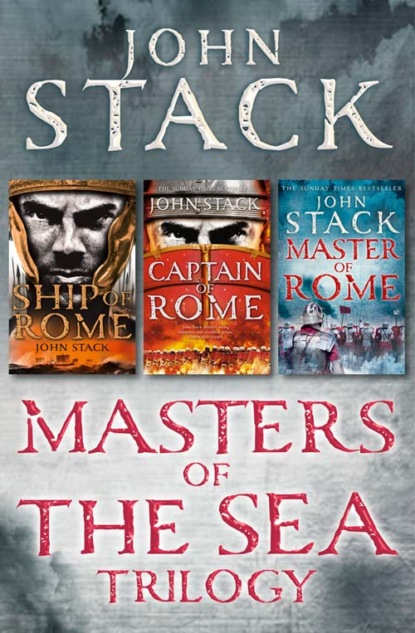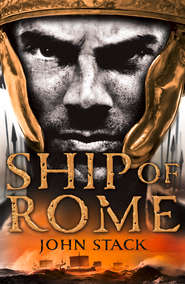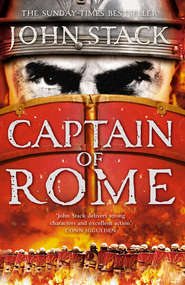По всем вопросам обращайтесь на: info@litportal.ru
(©) 2003-2025.
✖
Masters of the Sea Trilogy: Ship of Rome, Captain of Rome, Master of Rome
Автор
Год написания книги
2019
Настройки чтения
Размер шрифта
Высота строк
Поля
As Fulfidias waited on the aft-deck for the remaining crews to come on board the Aquila, his thoughts strayed to his own ship. She would be afloat by now, the repairs only three days short of completion when he had been drafted into service. She would be sitting at the dockside in Ostia instead of heading south under a favourable wind to Campania, where the approach of spring heralded the birthing season for sheep. In another week Fulfidias knew it would be too late for him to set sail and another trader would beat him to market with the prized lambs. The market of Ostia had no loyalty, no honour if those virtues stood in the way of profit, and so the men who regularly dealt with Fulfidias would immediately deal with the new supplier. The contacts and negotiating terms carefully built up by Fulfidias over ten years would be wiped away in one season.
As the trireme got under way, the young military commander began explaining the training that the teams would be undergoing that day. Fulfidias was not listening. He had sailed on trading galleys for over thirty years and he firmly believed there was nothing the young pup could teach him that he didn’t already know. The captain of the Sol raged internally at the injustice of life. The injustice of a system that robbed him of his livelihood with impunity. He had been forced into service, knowing that a refusal would result in banishment from the sea-lanes of Rome, and so he had acquiesced, but only to the point of being present. For Fulfidias that presence fulfilled his portion of the unfair contract.
*
Atticus finished his description of the day’s training ahead to the assembled captains and helmsmen on the aft-deck as the Aquila headed for the open sea. Of the ten men present, a half-dozen or so seemed to be giving the discussion their full attention, the number an increase on the day before. The others were distant, while two had expressions of open hostility. Atticus could understand their frustration and anger. He had chosen the life he led, a life dedicated to the navy. The men around him had also chosen their own path, until Rome had decided that they would follow her whim.
Atticus did his best to inject respect into his instructions, knowing that some of the men had greater experience of seamanship than he, albeit on non-military vessels. Many of the helmsmen and captains had sailed on galleys before and had a firm grasp of the basics, but they lacked the tactical thinking and fast decision-making skills required of a military commander. At sea and in battle, the line between victory and defeat was often drawn between men who commanded the events of the battle and men who simply reacted to the attacks of others. To be victorious at sea a captain needed to take the fight to the enemy.
As the Aquila sailed directly away from the shore she passed through the busy north–south sea-lane. The trireme was under oar power and so Gaius deferred to the sail-propelled vessels as he nimbly negotiated the crossing. Atticus looked over his shoulder at the receding shoreline. Against the black sands of Fiumicino, the polished skeletal frames of the new triremes stood out like ivory on black marble, their purpose evident even to an untrained eye. The spread of news in Ostia, Rome – in fact the whole Republic – was the result of the interconnected threads of the trading routes. That Rome could not keep anything secret was simply an unavoidable side effect of trade. The problem could not have been avoided, even if the camp had been placed away from a trading route. From the ships supplying raw materials to the merchants supplying the camp, there were simply too many people interacting with the site. It was only a matter of time before the Punici knew every detail there was to know about Rome’s new fleet.
Atticus cursed inwardly as he counted the odds stacked against them. Currently the Romans had no advantages over the Carthaginians. News of the new fleet would spread south eventually and the element of surprise would be lost. The enemy ships were heavier and crewed by more experienced sailors, highly skilled in ramming, while the newly recruited Roman crews were hopelessly unskilled. The Roman legionaries were certainly a match for the Carthaginians but, because of Tuditanus, they lacked the skills necessary for boarding and so could not carry the fight to the deck of an enemy galley.
As the Aquila cleared the last vessels of the sea-lane, Atticus turned once more to his trainees. It was time to begin. The training schedule was tedious and unrelenting and the recruits far from ready for battle. He could teach them the basics of every manoeuvre but in the end it was experience that counted. He could only hope they would have enough time.
CHAPTER NINE (#ulink_977fe362-e45f-58c4-8f86-8935028746c0)
‘How old is this report?’ Gisco roared. ‘Ten days at least,’ the messenger said, cringing from the admiral’s furious gaze.
‘Ten days! Ten days and it’s only reaching me now?’
Gisco stormed forward with the parchment crushed in his balled fist. He raised his arm and made to strike the messenger. The man drew back and threw his arm up to protect himself, knowing that the admiral’s fury would make any defence useless. Gisco stopped short and looked upon the cowering man with disgust.
‘Get out!’ he shouted, and the messenger fled.
The admiral turned and walked over to the desk in the centre of his tent high in the hills overlooking Makella.
The past five days had been quiet, the Romans now firmly ensconced in their camp beside the city walls below. The Romans had marched half their forces west to the city of Segeste two days after their arrival at Makella, their goal to once again lift a siege that Gisco had already lifted. The admiral had accompanied Hamilcar on the three-day shadow column that harassed and attacked the marching Romans’ supplies, and had personally directed two of the ambushes. As before, their attacks, when viewed individually, had been relatively ineffective, but taken as a whole, they had inflicted significant losses on the Romans’ irreplaceable provisions. The two weeks of fighting had cost Gisco over four hundred cavalry, but he had robbed the Roman legions of their manoeuvrability. It had been an uneven trade in his favour and he had been satisfied with the deal.
Until now. The news on the document in his hand changed everything. At first he had looked at it with incomprehension. It had only been a few weeks – four at most – since the blockade had been imposed, and yet, if the report was to be believed, the Romans were already building a fleet to challenge his own. How could they have moved so fast? And with such aggression? The Roman military’s prowess on land was well established and was such that Gisco was unwilling to attack them until the odds were heavily in his favour. Their navy, however, had always been inconsequential when compared to that of the Carthaginians. Their galleys were light and fast, but they were weak-hulled and no match for his own.
Gisco had one hundred and ten galleys in the waters around the west and north coast of Sicily. Surely the Romans could not dare to hope to overcome them? And yet the admiral knew from experience that the Romans did not do anything by half. The report was based on two things: one fact and the other rumour. The fact was the location of the new fleet, two miles north of Ostia on the Roman coast. The rumour was its size, and was stated as ‘in excess of one hundred’. This second part of the report would have to be verified. Gisco called for his aide and issued instructions for his horse to be prepared. He would leave for Panormus on the coast immediately. One thing was certain, one thing the report did not state but which was true nonetheless: the Romans were taking the fight to the Carthaginians. ‘Good,’ Gisco thought, buckling his scabbard, ‘we’ll be ready for them.’
*
‘So when will they be ready to sail?’ Scipio asked.
This was his second day at the camp and by now the senior consul was fully informed of almost every aspect of the operation. Only this one crucial question remained to be answered.
‘In four days,’ Tuditanus replied.
‘You’re sure?’
‘Yes, the hulls were completed on the twenty galleys yesterday. All that remains is the inner works, which have been immeasurably simplified to suit the task.’
‘Simplified how?’ Scipio asked, his natural curiosity aroused.
‘We have stripped out everything bar the bulkheads and the upper and lower decks. There will be no cabins, storage decks or sleeping quarters.’
Scipio nodded, understanding the logic of the decision. The fleet was being built for battle, a confrontation that would occur sooner rather than later. At this point in time there was no need to look at the functionality of the ships beyond the oncoming clash, the future beyond the battle still shrouded in uncertainty.
‘Do not tell the Senate of this schedule. If asked, your answer is six days. I want no one to know the ships will be ready in four.’
‘Yes, Consul,’ Tuditanus answered, never questioning the senior consul’s motives, Scipio’s gold being sufficient to command his allegiance.
Scipio dismissed Tuditanus and sat back on the couch in the expansive tent. In four days the first twenty galleys of the new fleet would be ready to sail. The Senate’s decision on command would be followed, but on the senior consul’s terms. He would take charge of these first twenty ships. What was important now was to take the initiative. The people of Rome were anxious to hear about the new fleet, anxious to know that the threat of the Carthaginians was being dealt with. The man who commanded the first fleet to sea would be the man they would remember. Scipio would be that man. He would sail the twenty new galleys into the port of Ostia and step triumphantly onto the dock, the backdrop of new triremes a show of force that would for ever after be associated with Scipio. In his mind’s eye he pictured every detail of the event. It would be perfect.
Septimus felt an incredible sense of freedom well up within him as he galloped along the Via Aurelia towards Rome. He glanced over his shoulder and spied Atticus hard on his heels, the captain’s expression mirroring his own, the unexpected furlough giving both men the opportunity to escape the confines of Fiumicino for twenty-four hours. Both men were acutely aware that this was going to be their last leave before sailing south again, and so Septimus had decided to visit his family home one last time. Atticus, a stranger in the city, had asked to accompany him and Septimus had quickly agreed.
An hour after leaving the camp at Fiumicino, Atticus and Septimus arrived at the Capito home. As before, and aware that her son was visiting for perhaps the last time, Salonina sent a messenger for her daughter. Hadria arrived in time for the evening meal and the family sat down together, the probable finality of the occasion neither acknowledged nor discussed.
The meal lasted three hours; however, when Salonina finally announced her intention to retire, Atticus was filled with disappointment at the shortness of the evening. Her husband Antoninus rose with her and both took their leave of the group before departing. The table before them was clear except for wine goblets and a half-filled amphora, the servants having cleared away all traces of the meal. Atticus, Hadria and Septimus sat in silence. Atticus leaned forward and picked up his wine, his smile returned by Hadria. He willed Septimus to go, to leave him and Hadria alone, although he was unsure what he would do if such an opportunity presented itself. The silence dragged on.
Hadria felt lightheaded. The pleasure of the evening combined with the wine she had drunk filled her with an enormous sense of wellbeing and she smiled unabashedly. She had noticed Atticus look at her again during the evening, his gaze intense and searching. Hadria recalled her first impressions of Atticus weeks before, how handsome he was, his dark Grecian complexion made striking by his green eyes. She also remembered becoming acutely aware of Atticus’s sidelong glances at her that evening and the touch of his gaze had sent shivers down her spine. For days afterwards she had been plagued by guilt, her attraction to Atticus feeling like a betrayal of Valerius; but now – as before – she did not want the night to end, and so she waited, content to know that Atticus was near her.
Septimus fought hard to suppress his growing disquiet at what he was witnessing, all the while wondering if he was misjudging the looks being exchanged between Atticus and his sister. His boyhood friend Valerius had been dead less than a year and, although his mother had said that Hadria’s heart was free, Septimus felt it was wrong for his friend and sister to share any feelings of attraction.
‘Atticus?’ Hadria asked, her voice finally breaking the silence. ‘Tell me about your ship. Why is she called the Aquila?’
‘She is named after the star constellation,’ Atticus answered, and began to describe the positions of the five major stars that formed the figure in the night sky. Hadria leaned in close to follow his every word.
‘Aquila was a faithful servant of Jupiter, the king of the gods,’ Atticus explained. ‘During the king’s war with the Titans on earth the eagle carried Jupiter’s lightning bolts from the heavens to strike the Titans. After the war was won, Jupiter immortalized Aquila in the stars as a reward for his loyalty.’
Hadria noticed that Atticus spoke in hushed tones, his deep, sonorous voice giving passion to the ancient story, a passion that reflected his obvious bond to his ship.
‘Loyalty …’ Septimus said suddenly, breaking the spell around Hadria, ‘the cornerstone of any friendship. Wouldn’t you agree, Atticus?’
‘What?’ he said, looking over at Septimus, the centurion’s expression unreadable.
Hadria was also unable to read Septimus’s face, but she knew the tone of his voice, knew its portent with the absolute certainty of a sibling. The underlying menace was undeniable. Her mind raced to understand its cause until she suddenly realized the reason for Septimus’s animosity. Valerius.
‘Septimus,’ Hadria said, cutting off her brother’s repetition of his question, ‘it’s late and I’m tired. Would you kindly escort me to my room?’
The suddenness of the request and the sweetness of the tone in which it was made arrested Septimus’s comment. Hadria stood up and made to leave the room, her brother falling in beside her. She glanced over her shoulder at Atticus who looked confused by the sudden turn of events.
‘Goodnight, Atticus,’ she said, trying to make her voice sound dispassionate.
‘Goodnight, Hadria. Goodnight, Septimus.’
The centurion did not return the platitude and the brother and sister left the room.
The abrupt end to the night and Hadria’s hasty departure had caught Atticus off guard. He had been acutely disappointed when Septimus had not left after the meal, but he had still held out hope that he would be able to engineer a moment alone with Hadria. Despite his frustration he smiled to himself. Perhaps there would be another chance.
Hadria turned at her door to say goodnight to her brother. He still looked slightly aggravated but she pretended not to notice and kissed him lightly on the cheek. The intimate gesture returned a slight smile to his face.
‘Goodnight, Septimus,’ she said.
‘Hadria?’ Septimus said, catching his sister lightly by the forearm, arresting her departure. ‘Do you no longer mourn for Valerius?’









